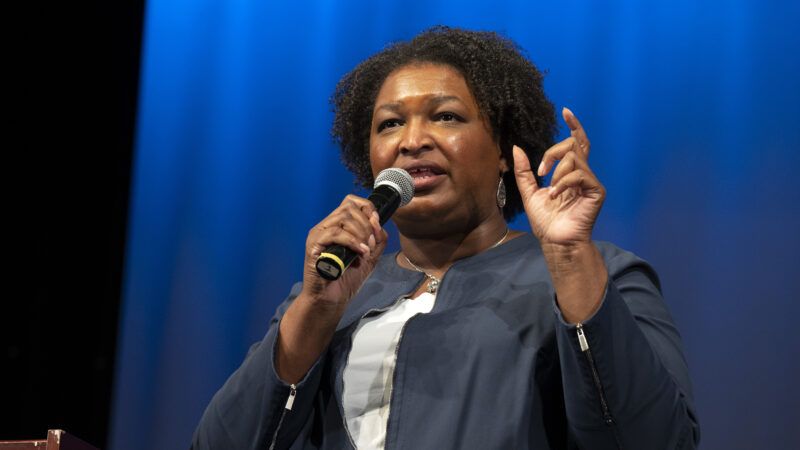No, Stacey Abrams Is Not Losing Because of 'Misinformation' Aimed at Black Men
"Unfortunately this year, black men have been a very targeted population for misinformation."

Stacey Abrams is the Democratic Party's nominee for governor of Georgia. Today's election is a rematch against incumbent Gov. Brian Kemp (R), who defeated her in 2018.
Last time, Abrams came close enough to victory that the party catapulted her to stardom. Mainstream media minted her a sort of political genius—an expert on mobilizing minority voters, who tend to be very loyal to Democrats. Abrams became a crusader for the cause of voting rights, and was a frequent subject of glowing national magazine profiles.
Yet Abrams is projected to lose once again—this time, by a somewhat larger margin. The race between incumbent Georgia Sen. Raphael Warnock (D) and challenger Hershel Walker (R) appears to be much closer than the race between Kemp and Abrams, which suggests that there are some Warnock voters who intend to split their ticket, or leave the gubernatorial ballot blank. Some evidence has emerged that Abrams is particularly struggling with men of color; while she is still likely to capture the overwhelming majority of black male voters in Georgia, her support among this key constituency appears to have fallen by about 8 points.
What explains the lack of enthusiasm for Abrams? The candidate herself is blaming an increasingly familiar bogeyman for Democrats: the dreaded specter of "misinformation," which she claims is aimed at black men.
"Unfortunately this year, black men have been a very targeted population for misinformation," said Abrams during a recent interview.
Keisha Lance Bottoms, a former Democratic mayor of Atlanta, expressed hearty agreement in an interview on MSNBC.
"I think that Stacey is spot on with that," said Bottoms. "I listen as my kids watch NBA highlights and whatever else they watch on YouTube. I hear the misinformation being piped in."
Brittney Cooper, an author and activist, took things a step further while speaking at Harvard University, referring to the "demon of disinformation" that was causing black men to vote for Warnock but not for Abrams.
Neither Abrams nor her campaign surrogates have identified specific falsehoods or misleading statements. This speaks to a much larger problem with Democratic, progressive, and mainstream media discourse on misinformation, disinformation, and malinformation—concepts that have increasingly captivated Team Blue, but are now so broadly applied as to be almost useless. Pundits and political figures complaining about misinformation might as well be saying that they don't like speech that is critical of them.
The obsession with misinformation is an inheritance of the 2016 presidential election, and choices made by Democrats in the wake of Hillary Clinton's unexpected loss. The campaign's preferred explanation for this shocking development was that Russian malfeasance on social media tossed the election to Donald Trump. This explanation never made all that much sense, given that most of these influence campaigns were much less impressive than they seemed. The older, white working-class voters in Michigan and Pennsylvania whose shifting allegiance cost Clinton the election were just as likely to have soured on Democrats due to political advocacy within traditional media—radio and cable news, for instance.
Obviously, political campaigns have actively engaged in mudslinging, dirty partisanship, and naked lying since the dawn of the republic. But when political figures warn of "misinformation," they are specifically gesturing at a sort of conspiratorial nefariousness, often Russian in origin. Much hay was made about Russian trolls allegedly targeting black voters, though it was never clear why this would have made much difference in the 2016 election—or why it was not just wrong but sinister for anyone to try to persuade black voters to vote differently.
Unfortunately, this paranoia about misinformation has become the default lens through which the media examines modern U.S. politics. And it has prompted federal government officials to push social media companies to do more to combat the alleged scourge, at the risk of seriously compromising free speech rights on those platforms.
Both parties whine when they lose, and Republican delusions about stolen elections are especially pathetic. But it's also delusional for a candidate to think they're losing because of a pernicious, Russian-based conspiracy to make minority voters think twice about their loyalty to Democrats.
Maybe black voters actually have legitimate questions about how Abrams' voting rights non-profit spent its money?

Show Comments (112)